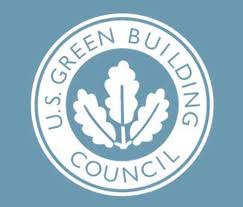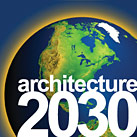
U.S. Green Building Council
SFIA is a member of The U.S. Green Building Council. USGBC is a Washington D.C. based nonprofit organization committed to a prosperous and sustainable future for our nation through cost-efficient and energy-saving green buildings. USGBC works toward its mission of market transformation through its LEED green building certification program, robust educational offerings, a nationwide network of chapters and affiliates, the annual Greenbuild International Conference & Expo, and advocacy in support of public policy that encourages and enables green building.

Build It Green
Build It Green is a membership supported non-profit organization whose mission is to promote healthy, energy- and resource-efficient homes in California. Build It Green’s program development strategy has been to incubate good ideas in the San Francisco Bay Area and then expand them statewide, helping to establish California as a role model to other states and the nation for developing pragmatic solutions to environmental challenges. We strive to design our programs to have wide-reaching policy impacts that can positively impact many Californians.

Association for the Advancement of Sustainability in Higher Education
SFIA is a member of the Association for the Advancement of Sustainability in Higher Education AASHE is an association of colleges and universities that are working to create a sustainable future. AASHE’s mission is to empower higher education to lead the sustainability transformation. AASHE provides resources, professional development, and a network of support to enable institutions of higher education to model and advance sustainability from governance and operations to education and research. AASHE defines sustainability in an inclusive way, encompassing human and ecological health, social justice, secure livelihoods, and a better world for all generations.

Association of University Leaders for a Sustainable Future
SFIA is a signatory of The Association of University Leaders for a Sustainable Future. (ULSF) is the Secretariat for signatories of the Talloires Declaration (1990), which has been signed by over 400 college and university presidents and chancellors worldwide. ULSF supports sustainability as a critical focus of teaching, research, operations and outreach in higher education through publications, research, and assessment.

Sustainable Buildings Industry Council
SFIA is a member of The Sustainable Buildings Industry Council. SBIC is an independent, non-profit organization and a pioneer advocate of the whole building approach to sustainable facilities. SBIC was founded in 1980 as the Passive Solar Industries Council by the major building trade groups, large corporations, small businesses, and individual practitioners who recognized that energy and resource efficient design and construction are imperative to a sustainable built environment. SBIC views energy use and sustainability within a larger context of benefits related to productivity and overall efficiency, health and safety, serviceability, and other performance factors. SBIC’s ideas are reflected in the Whole Building Design Guide, and in recent federal legislation mandating high-performance buildings, as well as the High-Performance Building Council agenda.

Architecture 2030
SFIA is a collaborator in Architecture 2030’s 2010 Imperative. To successfully impact global warming and world resource depletion, it is imperative that ecological literacy become a central tenet of design education. Architecture 2030, a non-profit, non-partisan and independent organization, was established in response to the global-warming crisis by architect Edward Mazria in 2002. 2030’s mission is to rapidly transform the US and global Building Sector from the major contributor of greenhouse gas emissions to a central part of the solution to the global-warming crisis. Our goal is straightforward: to achieve a dramatic reduction in the global-warming-causing greenhouse gas (GHG) emissions of the Building Sector by changing the way buildings and developments are planned, designed and constructed.
